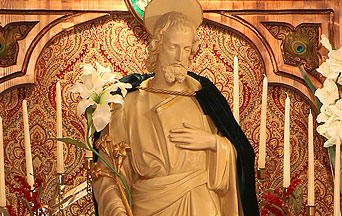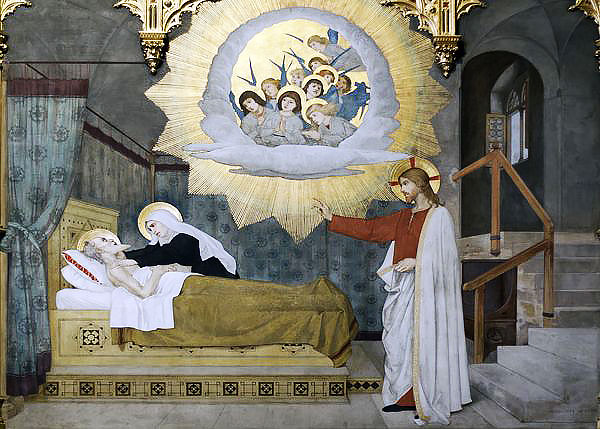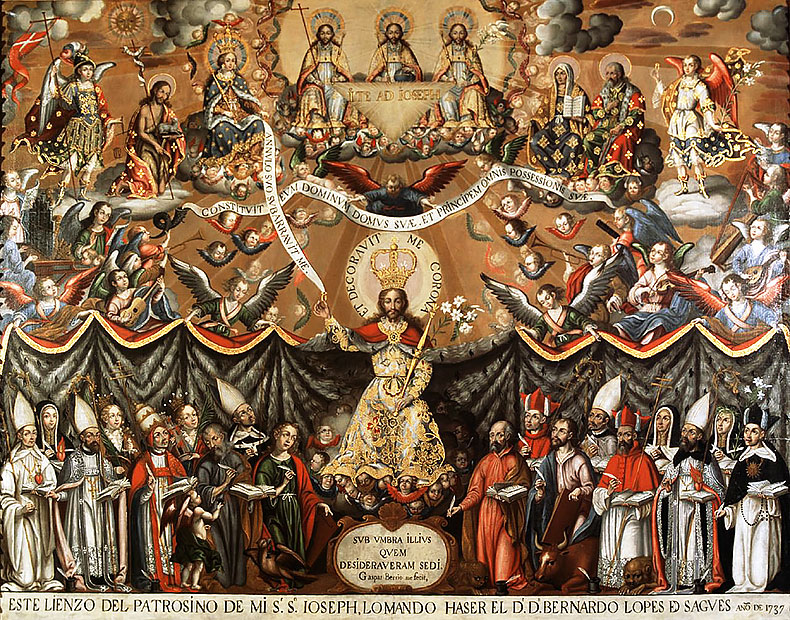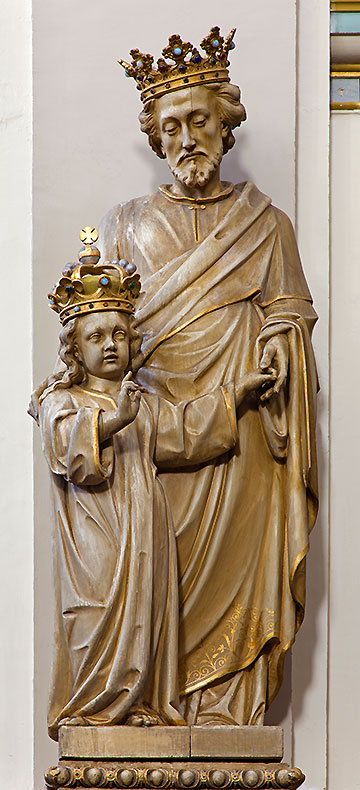
Saint Joseph: the Greatest of the Saints After Our Lady
“The opinion that Saint Joseph is the greatest of the saints after Our Lady is one which is becoming daily more commonly held in the Church,” writes the renowned French theologian, Fr. Reginald Garrigou-Lagrange (1877–1964).
He further holds, that, “We do not hesitate to look on the humble carpenter as higher in grace and eternal glory than the patriarchs and the greatest of the prophets—than Saint John the Baptist, the apostles, the martyrs and the great doctors of the Church.”1
Saint Joseph’s Pre-eminence Over the Other Saints
The doctrine of the preeminence of Saint Joseph received the approval of Pope Leo XIII in his encyclical Quamquam Pluries, August 15, 1899, in which he writes of the need to have recourse to the Patronage of Saint Joseph, together with that of the Virgin Mother of God, in the difficulties of the present times:
“In truth, the dignity of the Mother of God is so lofty that naught created can rank above it. But as Joseph has been united to the Blessed Virgin by the ties of marriage, it may not be doubted that he approached nearer than any to the eminent dignity by which the Mother of God surpasses so nobly all created natures. For marriage is the most intimate of all unions which from its essence imparts a community of gifts between those that by it are joined together. Thus in giving Joseph the Blessed Virgin as spouse, God appointed him to be not only her life’s companion, the witness of her maidenhood, the protector of her honor, but also, by virtue of the conjugal tie, a participator in her sublime dignity. And Joseph shines among all mankind by the most august dignity, since by divine will, he was the guardian of the Son of God and reputed as His father among men.”2
Fr. Garrigou-Lagrange explains the argument employed by theologians to justify this doctrine. It is found in the simplicity of Saint Thomas Aquinas in dealing with the fullness of grace in Jesus and holiness in Mary: “An exceptional divine mission calls for a corresponding degree of grace.”
In Praise of Saint Joseph’s Logic
This principle explains why Mary, called to be Mother of God, received from the instant of her conception an initial fullness of grace which was greater than the initial fullness of all the saints put together. She was closer than any other to the Source of grace, she thus received grace more abundantly. It also explains why the apostles, who were closer to Our Lord than the saints who came after them, had a more perfect knowledge of the mysteries of the faith. They received at Pentecost the gift of a more eminent, enlightened and firmer faith for the beginning of their apostolate, which enabled them to preach the gospel infallibly to the world.
The same truth explains the pre-eminence of Saint Joseph. He must have received an abundance of grace commensurate with his mission. He was chosen by God Himself to fulfill a unique mission in the world: to be the Spouse of the Mother of God, the Foster Father and Protector of the Savior.
 Learn All About the Prophecies of Our Lady of Good Success About Our Times
Learn All About the Prophecies of Our Lady of Good Success About Our Times
The French theologian quotes Saint Bernardine of Siena:
“When God chooses a person by grace for a very elevated mission, He gives all the graces required for it. This is verified in a specially outstanding manner in the case of Saint Joseph, Foster Father of Our Lord Jesus Christ and Spouse of Mary…”
Father Garrigou-Lagrange states that Saint Joseph’s predestination is one with the decree of the Incarnation, which includes Mary’s predestination to the divine motherhood and includes Joseph’s to be Foster Father and protector of the Incarnate Son of God.
He writes:
“The fact that Saint Joseph’s first predestination was one with the decree of the Incarnation shows how elevated his unique mission was. This is what people mean when they say that Saint Joseph was made and put into the world to be the Foster Father of the Incarnate Word and that God willed for him a high degree of glory and grace to fit him for his task.”
Saint Joseph’s Mission Borders on the Hypostatic Order
“Saint Joseph’s mission is evidently higher than the order of nature—even of angelic nature,” says Fr. Garrigou-Lagrange.
Is it also higher than the order of grace, in which are found the mission of Saint John the Baptist who prepared the way of salvation, or that of the apostles concerning the sanctification of souls?
He asserts that Saint Joseph’s mission surpassed them all in the order of grace:
“It borders, by its term, on the hypostatic order, which is constituted by the mystery of the Incarnation. … Mary’s unique mission, her divine motherhood, has its term in the hypostatic order. So also, in a sense, Saint Joseph’s hidden mission. This is the teaching of many saints and other writers.”
What Kind of Veneration Is Due to Saint Joseph?
Given the supereminent place that Saint Joseph occupies in the history of salvation, one must ask if he deserves a special veneration, superior to that given to the other saints.
The worship due to God is the supreme worship, which the theologians call the cult of latria. God wanted to make creatures participate in His incommunicable perfection. Thus, when the angels and saints shine by their virtues in a heroic degree, they can be venerated with a subordinate cult, called the cult of dulia.3
Mary Most Holy deserves a special veneration for being the Mother of God, and having reached a sublime and inimitable height of virtue and perfection. She deserves a special cult, which theologians call hyperdulia.4
Father Garrigou-Lagrange remarks:
“Perfection consists in doing God’s will, each one according to his vocation; Saint Joseph’s vocation of silence and obscurity surpassed that of the apostles because it bordered more nearly on the redemptive Incarnation. After Mary, Joseph was nearest to the Author of grace, and in the silence of Bethlehem, during the exile in Egypt, and in the little home of Nazareth he received more graces than any other saint.”5
Consequently, Saint Joseph deserves a veneration above the cult of the other saints, inferior only, in the order of mere creatures, to that of his Blessed Spouse.
Because of his special predestination and unique relationship with Jesus and Mary, in addition to an eminent holiness, many modern theologians designate the special cult of Saint Joseph as protodulia (that is, the first among those of dulia, due to the angels and saints).6
The Assumption of Saint Joseph
Such is Saint Joseph’s greatness that theologians have raised the hypothesis of the Assumption of the Holy Patriarch.7
This theological hypothesis is studied by Msgr. Arthur Burton Calkins, eminent American theologian. He quotes Father Francis L. Filas, S.J.:
“Independently of any reference in Scripture, the doctrine of the resurrection of Saint Joseph and the assumption of his glorified body into heaven could be proposed on grounds of fitness. Usually, however, it has been based on the words of Saint Matthew, ‘Many bodies of the saints who had fallen asleep arose; and coming forth out of the tombs after his resurrection, they came into the holy city and appeared to many’ (27:52, 53). …
“From the time of the Fathers of the Church the predominant opinion has been that these souls were reunited to their bodies never to die again; and that when Christ ascended into heaven, they entered heaven with Him, body and soul, for all eternity. Hence, their resurrection would not be a mere return to earthly life, but a revivifying and glorification of their bodies as will happen on the Last Day to the rest of the just. If this interpretation is correct, it is logical to assume (as numerous authors have done) that Saint Joseph was granted the glorification of his body at the moment of Christ’s resurrection. Of all, he would surpassingly deserve the privilege.”8
Saint Joseph, Martyr of Grandeur

Msgr. Calkins leaves the last word to Father Boniface Llamera, O.P. (1913-1959), “one of the most noted of the Spanish Dominican Josephologists of the twentieth century”:
“It seems reasonable that the Holy Family – Jesus, Mary and Joseph – predestined to initiate the new divine life of the human race, should also initiate the glorious life of the resurrection. It is true that Jesus and Mary are by far superior to Saint Joseph, but this superiority did not prevent the Saint from belonging to the Holy Family, even holding the place of husband and father. It seems very unlikely, then, that Jesus being risen, his providential father should not also be risen with Him, or that Mary should be risen without her most worthy spouse.
“We can, therefore, believe that Saint Joseph, our most loving Patriarch, has triumphed and enjoys with all the saints, in an absolute manner, the life of the soul as well as the life of the body, in eternal companionship with Jesus and Mary.”9
Patron of the Church
Having protected the Son of God in his earthly life, he continues to watch over the Mystical Body of Christ, the Holy Church.
For that reason, on December 8, 1870, Pope Pius IX declared the glorious Patriarch Patron of the Catholic Church:
“And now therefore, when in these most troublesome times the Church is beset by enemies on every side, and is weighed down by calamities so heavy that ungodly men assert that the gates of hell have at length prevailed against her, the venerable prelates of the whole Catholic world have presented to the Sovereign Pontiff their own petitions and those of the faithful committed to their charge, praying that he would deign to constitute Saint Joseph Patron of the Church. … Accordingly, it has now pleased our Most Holy Sovereign, Pope Pius IX, in order to entrust himself and all the faithful to the Patriarch Saint Joseph’s most powerful patronage, has chosen to comply with the prelates’ desire and has solemnly declared him Patron of the Catholic Church.”10
Here Is the Story of Saint Joseph’s Miracle at the Santa Fe Café
The same Pontiff, explaining the reasons that led him to make this decision, emphasizes first of all God’s own choice of Joseph, to whom He entrusted what was most precious to Him; he then points out that the Church throughout its history has honored Saint Joseph with Mary Most Holy, and that the Church in difficult circumstances has always had recourse to his protection with success.
In the same way Pope Leo XIII says:
“The special motives for which Saint Joseph has been proclaimed Patron of the Church, and from which the Church looks for singular benefit from his patronage and protection, are that Joseph was the spouse of Mary and that he was reputed the Father of Jesus Christ. … [B]ecause he is the spouse of Mary and the Father of Jesus Christ he holds, as it were, a paternal authority. It is, then, natural and worthy that as the Blessed Joseph ministered to all the needs of the family at Nazareth and girt it about with his protection, he should now cover with the cloak of his heavenly patronage and defend the Church of Jesus Christ.”11
Saint Joseph, Heavenly Protector Against Socialism
Being the heavenly Patron of the Church, Saint Joseph has to protect the faithful from the threats of one of the greatest enemies of the Church in all time, about which the Virgin Mary herself warned in Fatima: communism, the most extreme expression of socialism.
This is why the Popes have proposed Saint Joseph as a special patron of Catholics in the fight against socialism and communism.

“Patronage of Saint Joseph” painted by Gaspar Miguel de Berrío, c 1737, Museo Nacional de Bellas Artes, Chile.
On July 25, 1920, the fiftieth anniversary of the proclamation of Saint Joseph as Patron of the Universal Church, Pope Benedict XV published the Motu Proprio Bonum Sane.
In this document, after describing the advances of immorality and socialist propaganda, the Pope proposes Saint Joseph as the heavenly Protector against the contagion of socialism:
“We, therefore, most worried by the course of these events, when the occasion presented itself, did not fail to remind the children of the Church of their duty, … that is to say, to remind the men … who earn their bread through work, to keep them immune from the contagion of socialism, the most bitter enemy of Christian principles. We with great solicitude propose to them in a special way Saint Joseph, that they may follow him as their special guide and honor him as their heavenly Patron.”12
What the Popes Have to Say About Socialism
Likewise, in his 1937 encyclical Divini Redemptoris, Pope Pius XI, Benedict XV’s successor, placed the Church’s action against communism, the most radical form of socialism, under the protection of Saint Joseph:
“To hasten the advent of that ‘peace of Christ in the kingdom of Christ’ so ardently desired by all, We place the vast campaign of the Church against world Communism under the standard of Saint Joseph, her mighty Protector. He belongs to the working-class, and he bore the burdens of poverty for himself and the Holy Family, whose tender and vigilant head he was. To him was entrusted the Divine Child when Herod loosed his assassins against Him. In a life of faithful performance of everyday duties, he left an example for all those who must gain their bread by the toil of their hands. He won for himself the title of ‘The Just,’ serving thus as a living model of that Christian justice which should reign in social life.”13
Thus, Saint Joseph is the Patron of the Universal Church and Protector in the fight against socialism and communism.
Saint Joseph and the Apparitions at Fatima
Finally, it is worth noting that Saint Joseph was present at Fatima, during the apparition on October 13, 1917, when the Miracle of the Sun’s dance occurred. Lucia says:
“As Our Lady disappeared in the vast distance of the firmament, we saw next to the sun, Saint Joseph with the Child and Our Lady dressed in white with a blue mantle. Saint Joseph and the Child appeared to bless the world with gestures of their hands in the shape of a cross. A while later, this apparition having vanished, I saw Our Lord and Our Lady, who appeared to be Our Lady of Sorrows. Our Lord appeared to bless the world in the same way as Saint Joseph.”14
Is this an indication that the glorious Patriarch will have some participation in the events predicted by the Virgin in Fatima, among them the final defeat of communism and the triumph of her Immaculate Heart?
Science Confirms: Angels Took the House of Our Lady of Nazareth to Loreto
Saint Joseph with the Child Jesus Photo Credit: © Renáta Sedmáková – stock.adobe.com
Footnotes
- Father Reginald Garrigou-Lagrange, O.P., The Mother of The Saviour and Our Interior Life. Chapter VII, “The Predestination of Saint Joseph and His Eminent Sanctity,” at https://archive.org/stream/Garrigou-LagrangeEnglish/Mother%20of%20The%20Savior%20and%20Our%20Interior%20Life%20-%20Garrigou-Lagrange%2C%20Reginald%2C%20O.P__djvu.txt, accessed Mar. 13, 2021, 11:54 AM.
- Leo XIII, Encyclical Quamquam Pluries, August 15, 1899, http://www.vatican.va/content/leo-xiii/en/encyclicals/documents/hf_l-xiii_enc_15081889_quamquam-pluries.html, Mar. 16, 2021, 4:24 PM.
- A. Chollet, “Culte en général,” in Dictionnaire de Théologie Catholique, t. II, col. 2407.
- A. Chollet, loc. cit.
- Fr. Garrigou-Lagrange, loc. cit.
- Bonifacio Llamera, O.P., Teología de San José (BAC: Madrid, 1953), pp. 330-338.
- See Msgr. Arthur Burton Calkins, The Cultus of the Heart of Saint Joseph: An Inquiry into the Status Quæstionis, at https://mariancatechist.com/files/documents/HeartOfStJoseph2014November.pdf, Mar. 16, 2021, 6:22 PM.
- Francis L. Filas, S.J., Joseph: The Man Closest to Jesus—The Complete Life, Theology and Devotional History of Saint Joseph, second ed. (Boston: St. Paul Editions, 1962), 421-2. Apud Msgr. Calkins, loc. cit.
- Boniface Llamera, O.P., Saint Joseph, trans. by Sister Mary Elizabeth, O.P. (St. Louis: B. Herder Book Co., 1962), 272. Apud Msgr. Calkins, loc. cit.
- Sacred Congregation of Rites, Decree Quemadmodum Deus (Declaring Saint Joseph Patron of the Universal Church), December 8, 1870.
- Leo XIII, Encyclical Quamquam Pluries, (On Devotion to Saint Joseph), August 15th, 1889, n. 3, http://www.vatican.va/content/leo-xiii/en/encyclicals/documents/hf_l-xiii_enc_15081889_quamquam-pluries.html, Mar. 9, 2021, 12:56 PM.
- Benedict XV, Motu Proprio Bonum Sane (Devotion to Saint Joseph, Patron Saint of the Catholic Church for Half a Century), July 25, 1920, accessed Feb. 19, 2021, 10:28 AM. http://www.vatican.va/holy_father/benedict_xv/motu_proprio/documents/hf_ben-xv_motu-proprio_19200725_bonum-sane_it.html.
- Pius XI, Encyclical Divini Redemptoris (On Atheistic Communism), March 19, 1937, n. 81, http://www.documentacatholicaomnia.eu/04z/z_1937-03-19__SS_Pius_XI__Encyclica_%27Divini_Redemptoris%27__EN.doc.html.
- See Luiz Sérgio Solimeo, Fatima: A Message More Urgent Than Ever, available at https://tfp.org/fatima-a-message-more-urgent-than-ever/.


